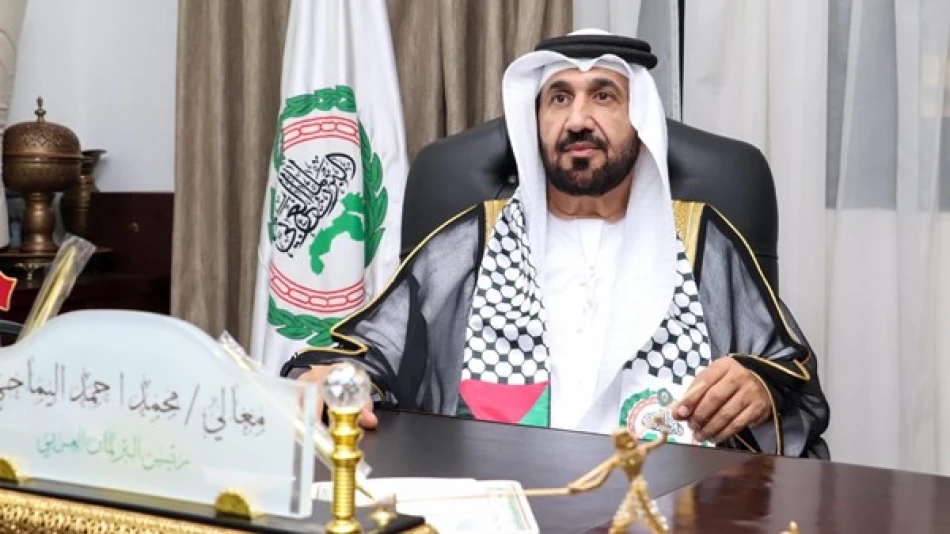
United Nations Endorses 'New York Declaration' on Two-State Solution, Arab Parliament Welcomes Move
UN General Assembly Endorses Two-State Solution Declaration in Rare Show of International Unity
The United Nations General Assembly has adopted a resolution supporting the New York Declaration on the two-state solution for Palestine, marking a significant diplomatic milestone that reinforces international consensus on Palestinian statehood. The Arab Parliament has welcomed this decision as a crucial step reflecting sustained global support for Palestinian self-determination and the establishment of an independent, sovereign Palestinian state.
A Strategic Victory for Palestinian Diplomacy
The resolution represents more than symbolic support—it demonstrates how sustained diplomatic pressure can yield concrete results even amid ongoing conflict. Mohammed bin Ahmed Al-Yamahi, President of the Arab Parliament, emphasized that the decision embodies the international community's collective will to support the two-state solution as the sole strategic option for achieving comprehensive peace and ending Israeli occupation of Palestinian territories.
This UN endorsement carries particular weight given the current geopolitical climate, where Middle Eastern issues often face deadlock in international forums. The successful passage suggests a broader shift in how the international community approaches the Palestinian question, moving beyond mere condemnation toward actionable frameworks.
Saudi-French Diplomatic Initiative Bears Fruit
July Conference Sets Foundation
The resolution builds directly on groundwork laid by Saudi Arabia and France, who co-sponsored a conference on peaceful settlement of the Palestinian issue in July 2024. This Saudi-French partnership represents an interesting diplomatic alignment—combining Saudi Arabia's regional influence and religious authority with France's European Union connections and historical diplomatic experience.
The New York Declaration emerging from that conference now serves as the implementation framework for the two-state solution, providing concrete parameters rather than abstract principles. This approach mirrors successful diplomatic initiatives like the Abraham Accords, where detailed frameworks preceded broader political agreements.
Regional Implications for Middle East Policy
Saudi involvement signals the kingdom's continued commitment to Palestinian statehood despite its evolving regional relationships. This stance could influence other Gulf states' positions and potentially impact future normalization discussions between Arab nations and Israel, as Palestinian statehood remains a key condition for broader regional peace.
International Law and Security Council Pressure
Al-Yamahi's call for the UN Security Council to assume its "historical responsibilities" highlights a critical gap between General Assembly resolutions and enforceable action. While General Assembly votes carry moral and political weight, they lack the binding authority of Security Council decisions.
The Arab Parliament's emphasis on international legitimacy and UN Charter principles reflects a strategy of using established legal frameworks rather than pursuing alternative diplomatic channels. This approach aims to isolate positions that contradict international consensus while building pressure for practical implementation steps.
Challenges Ahead for Implementation
Despite this diplomatic success, significant obstacles remain for translating UN support into ground-level changes. The resolution's call for ending what it terms "Israeli occupation crimes" and creating conditions for serious peace negotiations faces the reality of ongoing security concerns and political divisions on all sides.
The declaration's vision of an independent Palestinian state with Jerusalem as its capital based on international legitimacy resolutions sets a high bar that will require sustained international pressure and regional cooperation to achieve. Success will likely depend on whether supporting nations can maintain unified pressure for implementation beyond symbolic votes.
This UN endorsement may prove most valuable as a diplomatic baseline for future negotiations, establishing international consensus that negotiating parties cannot easily dismiss. The real test will be whether this moral authority can generate the practical steps needed to advance from declaration to reality.
Most Viewed News

 Layla Al Mansoori
Layla Al Mansoori






